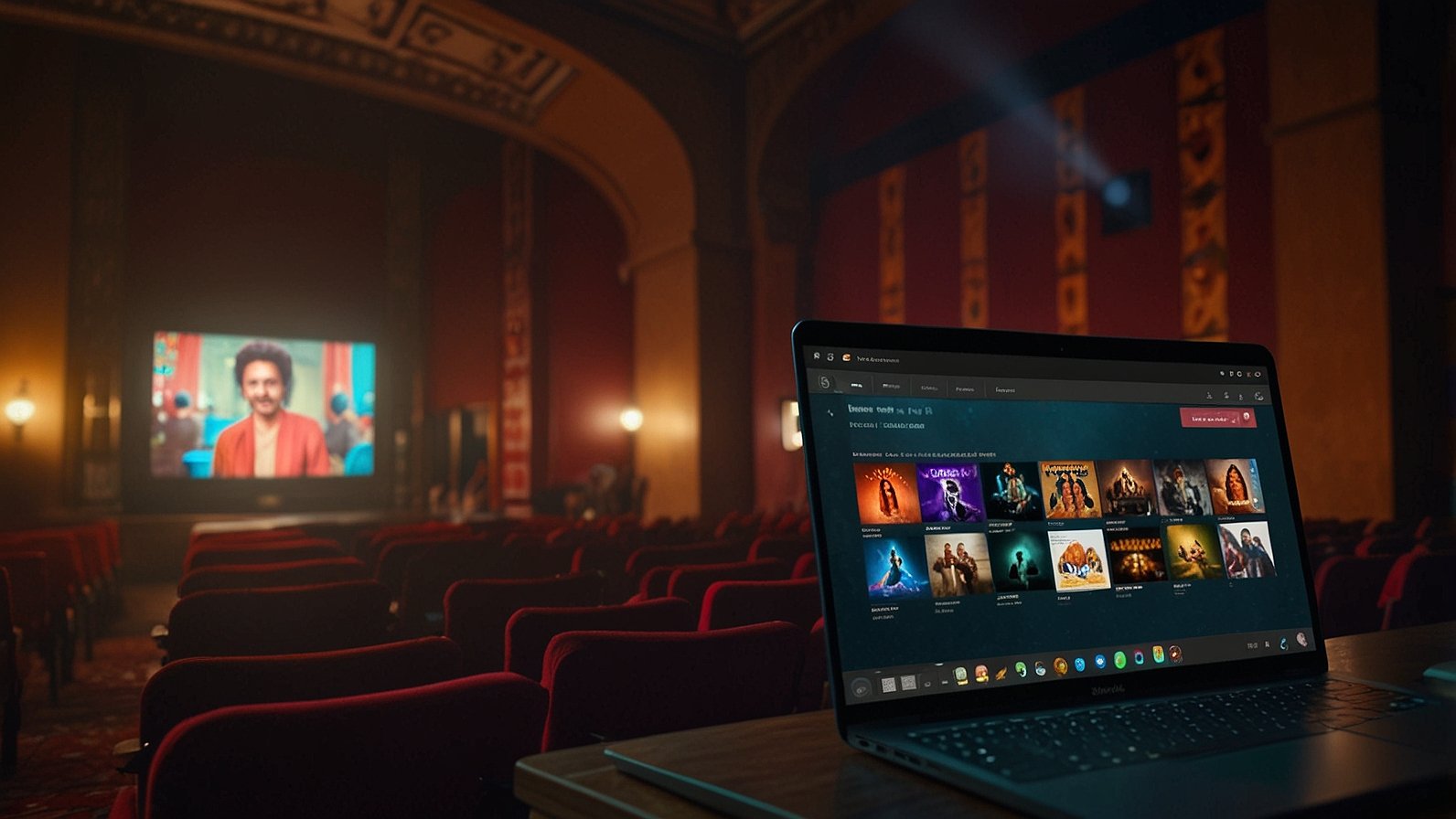Hook: Imagine waiting months for that blockbuster Telugu film to finally hit your local streaming service, only to discover friends worldwide watched it in HD for free mere days after its theatre debut. This isn’t sci-fi; it’s the reality fueled by platforms like iBOMMA. While the promise of instant, free access is tempting, the ripple effects through regional cinema industries like Tollywood are devastating.
The digital age promised convenience, but for film industries across South India and beyond, it also unleashed a relentless wave of piracy. Sites offering the “latest releases free” have mushroomed, with iBOMMA becoming a notorious name synonymous with unauthorized access to Telugu, Tamil, Hindi, Kannada, and Malayalam films. But what lies beneath that tempting “HD Download” button?
The Allure and Mechanics of Instant Gratification
It’s easy to see the appeal. Why pay for multiple subscriptions or theatre tickets when a quick search lands you the hottest release? Sites like iBOMMA operate on a simple, yet illegal, premise:
- Acquisition: New films are sourced illicitly, often recorded in theatres (camrips) or leaked from post-production/digital distribution channels (Web-DLs, sometimes even pre-OTT release).
- Distribution: These copies are rapidly uploaded to the site’s servers, often hosted in jurisdictions with lax copyright enforcement.
- Access: Users find the film through search engines or direct links. Streaming is usually free, supported by intrusive ads; downloads might require navigating ad-laden pages or dubious links.
- Speed is Key: The platform’s notoriety hinges on how quickly it uploads new releases, capitalizing on peak audience demand immediately after a film’s premiere or even before its legal digital release.
- The Illusion of Safety: Users might mistakenly believe visiting such sites is harmless. In reality, they expose themselves to malware risks and contribute to a significant criminal enterprise.
The Crushing Impact on Regional Cinema
The consequences of widespread piracy, facilitated by sites like iBOMMA, extend far beyond a missed cinema ticket sale. They strike at the heart of creative ecosystems:
- Box Office Bleeding: The most immediate impact. When high-quality pirated copies are available globally within days, or even hours, of release, potential paying audiences – especially the crucial initial weekend crowd – evaporate. This directly slashes the film’s primary revenue stream.
- OTT Devaluation: Producers often rely on lucrative deals with streaming platforms (OTT services) for a significant portion of their returns. If a film is already widely pirated before its scheduled OTT debut, the value of these deals plummets. Why would a platform pay top dollar for content audiences have already consumed illegally?
- Investment Chilling Effect: When piracy consistently erodes profits, investors become wary. Funding for new projects, especially mid-budget films and daring content from emerging filmmakers, dries up. The financial risk becomes too high.
- Job Losses Across the Board: It’s not just about stars and producers. Piracy impacts thousands: from camera crews, lighting technicians, and editors to set designers, makeup artists, marketing teams, and local theatre staff. Their livelihoods depend on a financially viable industry.
- Quality Compromise: With budgets shrinking due to piracy fears, filmmakers may be forced to cut corners, impacting production values, visual effects, and overall cinematic ambition. The vibrant diversity of regional cinema suffers.
Tollywood in the Crosshairs: Telugu cinema, renowned for its high-octane action, grand visuals, and massive budgets, is particularly vulnerable. Big-ticket films represent enormous investments. When pirated versions of these spectacles flood sites like iBOMMA immediately, the potential for catastrophic financial losses is immense, destabilizing the entire ecosystem.
Beyond the Obvious: The Persistent Challenge
Despite industry crackdowns, ISP blocks, and legal actions:
- Domain Whack-a-Mole: As soon as one domain (like
ibomma.xxx) is shut down, mirror sites or clones (ibomma.xyz,ibomma.cc, etc.) spring up almost instantly, making permanent eradication incredibly difficult. - Global Audience, Local Laws: These sites often operate from countries with weak copyright enforcement, exploiting legal loopholes and making international prosecution complex and slow.
- The Convenience Factor: For audiences, especially those outside India or without easy access to legal platforms, the sheer ease of access remains a powerful draw, outweighing ethical concerns for many.
- Misplaced Justification: Some users rationalize piracy, citing high ticket prices, lack of regional availability, or delayed OTT releases. While these are valid consumer frustrations, they don’t justify theft of intellectual property.
Choosing the Ethical Path: Supporting the Stories You Love
Enjoying films shouldn’t come at the cost of destroying the industry that creates them. Here’s how you can make a difference:
- Theatre First: Experience the magic as intended! Support the big-screen spectacle, especially for major releases in their opening weeks.
- Legitimate Streaming: Subscribe to authorized OTT platforms. Many offer vast libraries of regional content:
- Telugu/Tamil/Hindi/Malayalam/Kannada: Netflix, Amazon Prime Video, Disney+ Hotstar, Aha (Telugu), Sun NXT, ZEE5, SonyLIV, ManoramaMAX.
- Check Release Dates: Be patient. Legal streaming dates are usually announced well in advance.
- Rent or Buy: Platforms like YouTube Movies, Google Play Movies & TV, and Apple TV offer individual film rentals or purchases shortly after (or sometimes during) their theatrical run.
- Spread Awareness: Talk to friends and family about the real cost of piracy. Encourage them to choose legal options.
- Report Piracy: If you encounter illegal streaming sites or links, report them to the content owners or anti-piracy agencies when possible.
Key Takeaways: Your Choice Matters
The next time you’re tempted by the instant, free access promised by sites like iBOMMA, remember:
- It’s Not Victimless: Every illegal download or stream directly impacts the wages and jobs of countless individuals who poured their talent into the film.
- It Threatens Future Films: Piracy makes investors hesitant, risking fewer films, lower budgets, and less diverse storytelling.
- Legal Options Exist & Are Growing: The accessibility and affordability of legitimate streaming are constantly improving.
- Quality & Safety: Legal platforms offer guaranteed quality, safety from malware, and support the creators.
Choosing legal avenues isn’t just about following the rules; it’s about actively investing in the future of the vibrant regional cinemas we cherish. The stories, the music, the spectacle – they all depend on a sustainable ecosystem.
What’s one legal streaming platform you’ll explore for your next favorite regional film?
You May Also Read: MyWape: Stream & Download Without the Wait! (Finally)
FAQs
Is using iBOMMA legal?
No. iBOMMA and similar sites distribute copyrighted movies without permission from the owners, making streaming or downloading from them illegal copyright infringement.
Can I get in trouble for using sites like iBOMMA?
While individual users are rarely prosecuted compared to site operators, accessing pirated content is illegal. You also risk exposing your device to malware and intrusive advertising.
Why are movies on iBOMMA available so fast?
They are obtained illegally through methods like camcording in theatres, hacking, or leaks from production or distribution channels before the official release windows.
What’s the difference between iBOMMA and legal streaming?
Legal streaming services (Netflix, Hotstar, Amazon Prime, Aha, Sun NXT, etc.) pay licensing fees to the copyright holders, directly supporting the creators. iBOMMA steals the content and offers it without permission.
I live outside India and can’t access some platforms. Does that make piracy okay?
Lack of access is frustrating, but it doesn’t make piracy legal or ethical. Many platforms are expanding globally, and VPNs (used responsibly to access geo-restricted content you have a subscription for) or digital rental/purchase options are often available.
How does piracy specifically hurt Tollywood or other regional industries?
It drastically reduces box office revenue and devalues OTT deals, leading to lower investment in future films, budget cuts, job losses across the industry (not just actors), and potentially less diverse or ambitious filmmaking.
What can I do if I want a film that isn’t available legally in my region yet?
Be patient. Check official sources for release dates. Consider legal digital rental/purchase options which might be available sooner than subscriptions. Contact the official distributors to express interest – demand signals matter! Avoid the temptation of piracy sites.










